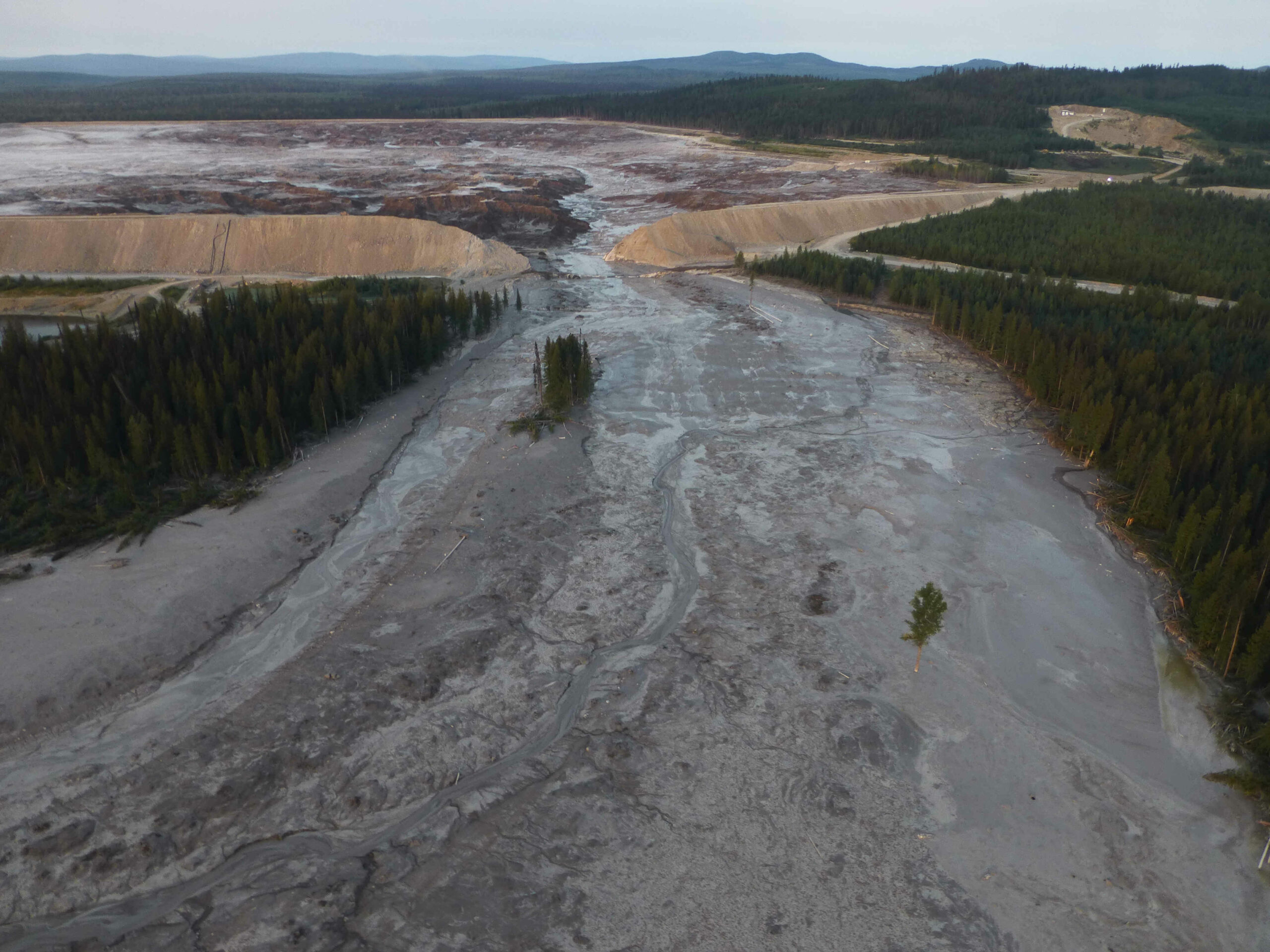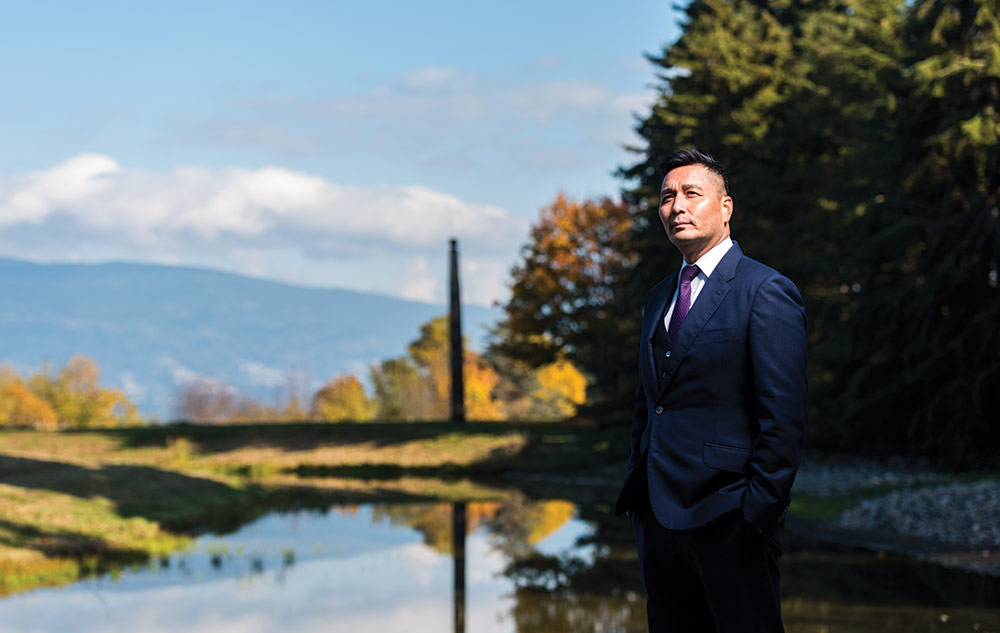
Our trial is a week away
We’re suing the RCMP for arresting a journalist on assignment for The Narwhal. It’s an...
Get the inside scoop on The Narwhal’s environment and climate reporting by signing up for our free newsletter.
Xatśūll First Nation has filed for an injunction with the Supreme Court of British Columbia to halt Mount Polley mine in raising its tailings dam — the site of one of the worst mining disasters in B.C.’s history.
This injunction, filed on April 25, comes a week after the nation applied for a judicial review against the province for its decision to approve the dam raising without the nation’s consent and without an environmental assessment.
Mount Polley mine, located in central B.C. and owned by Imperial Metals, plans to raise the tailings pond dam by four metres. In March, B.C. ministers decided to allow the gold and copper mine to go ahead to the permitting stage without an environmental assessment.
Xatśūll First Nation Kukpi7 (Chief) Rhonda Phillips said the nation’s call for an environmental assessment was ignored and they are fighting the expansion going ahead without their consent — all while their land and water is still in recovery from the 2014 spill.

On Aug. 4, 2014, a tailings dam breached, causing an estimated 25 billion litres of contaminated materials to gush into Polley Lake, Hazeltine Creek and Quesnel Lake, a source of drinking water and major spawning grounds for sockeye salmon. The sludge mining waste included nickel, arsenic, lead and copper, and contaminants can still be detected in Quesnel Lake more than a decade later. B.C. taxpayers covered $40 million in cleanup costs. Imperial Metals went to court last December facing 15 charges under the federal Fisheries Act for the spill.
On April 25, Xatśūll released a statement that it informed Imperial Metals it planned to file an injunction and asked the company to voluntarily halt construction while matters were settled in court. The statement said Brian Kynoch, president of Imperial Metals, said the company would not hold off and construction had already begun. Imperial Metals did not respond to The Narwhal’s request for comment.
In March, as B.C. was clearing the way for Mount Polley to expand, it was doing the same for another mine in Xatśūll territory. The BC Environmental Assessment office decided not to do an environmental assessment for an expansion of Gibraltar Mine (owned by Taseko). It’s the second-largest open-pit copper mine in Canada and has never had an environmental assessment.
“Our territory is already overburdened by irresponsible resource extraction,” Phillips said.
“We are on the front line of environmental harm caused by government decisions made without us.”


The court challenge comes amid heightened conversation around expediting industrial projects in the face of U.S. tariffs. Expediting projects may sound like it will save time and money, but if it’s at the expense of First Nations, that can backfire in costly court challenges and delays. Courts have repeatedly recognized the constitutionally enshrined rights of First Nations. Indigenous leaders are arguing history has shown consent brings certainty, and lack of consent brings conflict and delays.
“We will not stand idly by and allow the government to fast-track and completely ignore their legal obligations through the Declaration on the Rights of Indigenous Peoples Act and all the other legal and constitutional obligations they have,” Grand Chief Stewart Phillip, president of the Union of B.C. Indian Chiefs, said at a press event on April 15 in support of Xatśūll (pronounced hat-sooth).

Rhonda Phillips, the Xatśūll chief, said the nation recognizes the need for mining and is not trying to stop it completely. They want development that is “responsible, sustainable and carried out in partnership with Indigenous Nations,” she said.
“We must be part of how development happens.”
The Ministry of Mining and Critical Minerals told The Narwhal it cannot comment on matters before the court.
To Phillips, recent political rhetoric around expediting industrial projects is related to B.C.’s decision to go ahead without the nation’s consent on the dam height increase. Instead of only thinking of the cost of tariffs, she said politicians should be considering the cost of “our clean air, clean water.”
“We should be taking a step back and looking to the future,” she said.
“Section 35 of the constitution of Canada recognizes Aboriginal rights and title. It does not say, ‘recognize Aboriginal title and rights, except when there’s a conflict,’ ” Hugh Braker with the First Nations Summit said at the April 15 press event. “They are important today as they were yesterday and the day before.”
While First Nations are raising concerns about deregulation and speeding up industrial projects in light of U.S. President Donald Trump’s threats, it’s not a new phenomenon — when provinces, territories or the federal government skip over the duty to consult, they wind up in court. That’s why B.C. and Canada both adopted law to enshrine the Declaration on the Rights of Indigenous Peoples, as a way to improve relations and negotiations with Indigenous Peoples. Importantly, the declaration recognizes the need for Indigenous Peoples’ free, prior and informed consent. That means a role in decision-making, not just being informed about what will happen.
Since then, provincial and federal officials and Indigenous governments have been trying to improve decision-making processes. But at the same time, the issue of bypassing consent hasn’t disappeared; in the last year alone, there have been a slew of legal challenges in B.C. and beyond.
Last year, Gitanyow Hereditary Chiefs filed a court challenge against the Ksi Lisims liquefied natural gas project, alleging the environmental assessment office failed in its duty to consult.
Also last year, six First Nations in Ontario took the province to court over its mining law, which allows claim staking without consultation, alleging it violates their Treaty and constitutional Rights. Asubpeeschoseewagong Anishinabek, or Grassy Narrows First Nation, similarly launched a court challenge that the staking system violates the constitution and the United Nations Declaration on the Rights of Indigenous Peoples.
In March, the Athabasca-Chipewyan First Nation sued the Alberta Energy Regulator for failing to uphold Treaty Rights, responding to two toxic leaks by Imperial Oil. Toxic waste had been leaking into groundwater for months before First Nations were notified. They also challenged Alberta on allegations it failed to address issues in a program meant to ensure mining companies, not taxpayers, foot the bill on cleanups.

In April, First Nations and community groups filed a judicial review of B.C.’s approval of the Prince Rupert Gas Transmission pipeline, claiming the BC Energy Regular bent its own rules and allowed clearing work to begin before a legally required assessment took place.
B.C. also recently enacted a new policy for issuing mineral claims it was court-ordered to create, since Gitxaała and Ehattesaht nations successfully argued staking claims without consultation breached the government’s duty to consult.
When Indigenous governments have mounted the resources to wage a court battle for their rights, they have repeatedly won. In February, Kebaowek First Nation in Quebec successfully argued the federal government had not fully consulted with them and temporarily halted a nuclear waste storage project.
Merle Alexander, a principle with Miller Titerle + Company who practices Indigenous resource law, said moving ahead without consent brings uncertainty.
Consent is granted according to Indigenous legal orders, “and to not obtain their consent is to break their laws,” as well as acting inconsistent with B.C.’s Declaration on the Rights of Indigenous Peoples Act, he told The Narwhal.
First Nations are exercising their laws on their territory, but the Crown “is using their laws to exempt or bypass First Nations legal orders,” he added.
“There will be higher risk if proponents don’t follow their own due diligence and either pass through an Indigenous-led assessment or negotiate consent with the nation.”

While Indigenous governments have been negotiating for co-jurisdiction, Alexander fears the Crown is going the opposite direction. He pointed out the federal Liberals and Conservatives are designing fast-track approval processes for industrial projects, and if they do so without co-developing with Indigenous Peoples, “it will create the same uncertainty” seen in the slew of recent court challenges at the provincial level.
“By themselves, the Crown is likely to develop approvals without Indigenous consent mechanisms, so they’re charting towards the same rocks,” he said.
Minister of Environment and Parks Tamara Davidson and Minister of Mining and Critical Minerals Jagrup Brar published their decision on March 27, saying Mount Polley mine must manage higher water volume during the spring melt. They acknowledged the mine has applied to further expand its operations, and this “interim” height increase is separate from the expansion request. The expansion would extend the life of the mine, and as part of that request the mine shared plans to raise the dam by another 13 metres to store more liquid tailings over time.
In the decision, they said there is “no legislated requirement” to seek consensus from First Nations while granting their own consent for the project.
They said the environmental assessment office consulted with Xatśūll First Nation and Williams Lake First Nation, but B.C.’s current consultation process is mired with critiques that the process is simply about checking boxes. Phillips called it “drive-by” consultation that is not meaningful.


Phillips said the nation “will not back down,” and demanded expansion plans be halted by B.C. and Mount Polley Mining Corporation — a subsidiary of Imperial Metals — until the nation’s concerns are addressed.
An environmental assessment would help them “understand the impact” already on the landscape and how long it will take to recover, Phillips told The Narwhal.
“There’s hardly any area to go hunting anymore,” she said. She said the nation has to purchase salmon from neighbouring nations because people fear water contamination.
“It has impacted our traditional ways of life and our way of being.”
Alexander and others have been pushing for legislative reform to the Mineral Tenure Act and other laws to align with the Declaration on the Rights of Indigenous Peoples and bring Indigenous governments into decision-making.
Experts have ideas how mining operations can be improved. Last year, former Xatśūll chief Bev Sellars co-wrote an op-ed with law researcher Neil Nunn and former BC Green Party leader Sonia Furstenau, calling on B.C. to implement policies that prioritize “precaution over profit,” including lowering the threshold for mandatory environmental assessments and closing loopholes for avoiding environmental assessments by “splitting projects into smaller parts.”

By expanding mines over time, mining companies can vastly increase their footprint beyond what was covered in the initial environmental assessment. As of 2023, the Greenhills metallurgical coal mine in southeast B.C., owned by Swiss mining giant Glencore, grew by 52 per cent from when it was assessed in 2001.
Phillips wants to see the province invest in safer alternatives for storing mining waste, like dry stack tailings, which is exactly what it sounds like: waste is dried up and stacked. It is more expensive, but some argue it is more sustainable and less likely to leak. On its website, the Mount Polley Mining Corporation says it is testing dry stacking and acknowledges it “significantly” reduces the environmental impact compared to conventional tailings storage.
To Phillips, the battle over Mount Polley “is not just about Xatśūll.”
“This is about all First Nations who have watched decisions being made on our lands without our voices,” she said.
“We will fight for our lands. We will fight for our survival.”
Enbridge Gas will face Waterloo Region in a hearing before the Ontario Energy Board to renew an agreement that would allow the company to continue...
Continue reading
We’re suing the RCMP for arresting a journalist on assignment for The Narwhal. It’s an...

As glaciers in Western Canada retreat at an alarming rate, guides on the frontlines are...

For 15 years and counting, my commute from Mississauga to Toronto has been mired by...